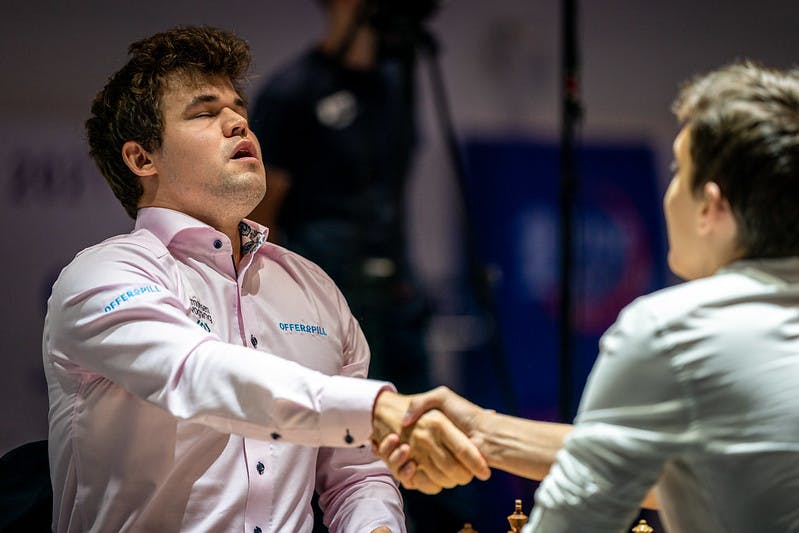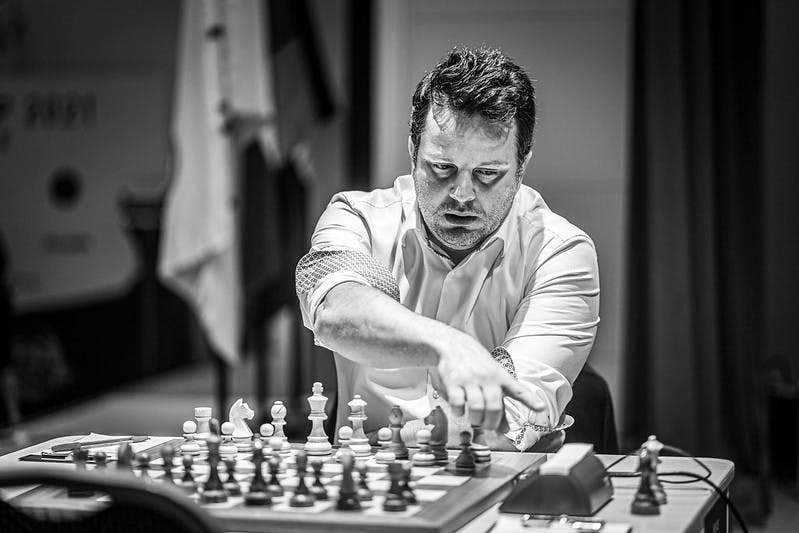FIDE World Cup - Round 5 Report: 6 of 8 Games go to Tense Tiebreaks
Excitement in the tiebreaks as Carlsen narrowly holds on

After a tense and edgy round in both the World Cup and Women’s World Cup, the quarter-finalists and semi-finalists are now known:
World Cup (Quarter-finals):
Magnus Carlsen (2847) v. Etienne Bacrot (2678)
Jan-Krzysztof Duda (2738) v. Santosh Gujrathi Vidit (2726)
Vladimir Fedoseev (2696) v. Amin Tabatabaei (2613)
Sergey Karjakin (2757) v. Sam Shankland (2709)
Women’s World Cup (Semi-finals):
Aleksandra Goryachkina (2596) v. Anna Muzychuk (2527)
Alexandra Kosteniuk (2472) v. Zhongyi Tan (2511)
Both tournaments will be starting at midday (12:00) UTC, on the 28th July and the broadcast can be watched here for the Open, and here for the Women's.
[Title image - Eric Rosen / FIDE]
Round 5, Game 1: Open
The first game of the round was understandably tense and edgy, as seven of the eight games ended in draws.
The only result of the day ending with a player getting the full point was GM Haik Martirosyan (2632) winning against GM Amin Tabatabaei (2613). Martirosyan had an additional pawn he had picked up in the middlegame, and was able to hold and then convert to win the full point.
https://lichess.org/study/embed/WCUperNf/fLxJX08P
Meanwhile, GM Sergey Karjakin (2757) and GM Maxime Vachier-Lagrave (2749) went into a theoretical Berlin defence, and ended up quickly drawing. Karjakin ended the game with more time on his clock than he started with, due to the increment after each move.

[photo credit: Anastasiia Korolkova / FIDE]
World Champion GM Magnus Carlsen (2847) played a Catalan - a potential surprise for the young Russian player and GM Andrey Esipenko (2716). The Catalan is rarely played by Carlsen, but even so Esipenko defended tenaciously and both players drew their first encounter of round 5.
Round 5, Game 1: Women
Much like the Open World Cup, given the closeness in ability and importance of a victory, three of the four games in the Women’s World Cup went to draws.
The only decisive result came between the two Russian players, GM Alexandra Kosteniuk (2472) and GM Valentina Gunina (2437). Gunina appeared to have an advantage most of the game, with the engine also spotting two chances for her to win the game. But, unfortunately for Gunina she was unable to find the winning lines, and Kosteniuk went on to win an opposite-bishops endgame.
https://lichess.org/study/embed/kVoW66v3/R4LcVB2Z
Meanwhile, every other game of the round went to a draw - including the one between the women top seed GM Aleksandra Goryachkina (2596) and IM Dinara Saduakassova (2483).
Round 5, Game 2: Open
Two players had decisive games in their return game, with both being confirmed as qualifying through to the quarterfinals of the World Cup.
GM Santosh Gujrathi Vidit (2726) had winning chances against his opponent, GM Vasif Durarbayli (2625), in their first encounter, but it ended in a draw. In their second encounter, Vidit minimised the importance of Durarbayli’s light-squared bishop - and with Durarabayli effectively playing a piece down, Vidit secured the win to qualify into the quarterfinals.
https://lichess.org/study/embed/br7gqipY/suPJKge7
Meanwhile, American GM Sam Shankland (2709) played an exciting and aggressive game against GM Peter Svidler (2714), as games with opposite castled kings often are. In a complex and dynamic position, full of threats and counter threats, Svidler misjudged and Shankland was able to convert the point.
Iranian GM Amin Tabatabaei (2613) won on demand against GM Haik Martirosyan (2632) in another game worthy of becoming an endgame study. In the position (below), Martirosyan exchanged knights - a blunder costing him the game. However, it isn't immediately clear why it is a terminal blunder (unless we have a super-GM reading this summary…)
The position after Martirosyan exchanged knights
https://lichess.org/study/embed/br7gqipY/YPRJRvXY#116
It isn’t necessarily an issue that Tabatabaei can get his king round to his passed pawn - Martirosyan also had a passed pawn. And, it isn’t necessarily an issue Tabatabaei can promote first - as Martirosyan can promote the next move with a check. The major issue is that because after 65 ...d2+, Martirosyan’s king is now on the 2nd rank - so when Tabatabaei’s newly promoted queen blocks the check, it counter-checks Martirosyan’s king, forcing an exchange of kings and giving Tabatabaei a simple endgame win afterwards.
https://lichess.org/study/embed/br7gqipY/YPRJRvXY#134
Here, Martirosyan resigned - because even though black will promote first, white will promote with check. Black will play Qg2+, blocking their own check and counter-checking, forcing a trade of queens and a winning position for black.
Whilst that game took close to five hours of play, GM Maxime Vachier-Lagrave (2749) and GM Sergey Karjakin (2757) had already blitzed out their entire game within four minutes of the round starting, in an exciting but drawing line of the Grunfeld.
Round 5, Game 2: Women’s
Three of the games in the Women’s World Cup were decisive, whereas GM Anna Muzychuk (2527) and GM Nana Dzagnidze (2523) head to tiebreaks to determine who will qualify to the semifinals.
Perhaps the most exciting game was fought between GM Alexandra Kosteniuk (2472) and GM Valentina Gunina (2437). Gunina, who had lost their previous game, was forced to play aggressively to stay in the round. But, Kosteniuk defended tenaciously and was able to counter attack, ultimately defeating Gunina, eliminating her from the tournament.
https://lichess.org/study/embed/yXN0jLHQ/nXcodynb
Meanwhile IM Dinara Saduakassovo (2483) played a London system against Russian women’s top seed, GM Aleksandra Goryachkina (2596). But, an unfortunate blunder from Saduakassovo led to a swift decisive result for Goryachkina, who will be playing the winner of Muzychuk v. Dzagnidze in the semifinals.
Round 5, Tiebreaks: Open and Women’s
With so many games in both the Open and Women’s World Cup being settled by tiebreaks, the day was full of action.
In the Open, the young Russian GM Andrey Esipenko (2716) had held World Champion GM Magnus Carlsen (2847) to two draws in the classical length games - already the most impressive defence against Carlsen by anyone in this tournament. In the first set of rapid tiebreaks, Esipenko continued to hold Carlsen to a nail-biting series of draws. In the second set of rapid tiebreaks, with the time control for both players reducing to 10+10, Esipenko unfortunately lost the first - only to bounce back, and win on demand against Carlsen to force the blitz tiebreaks. Unfortunately, after such a valiant and impressive show of resolve from the Russian 19 year old, Carlsen’s blitz play overwhelmed him - allowing Carlsen to proceed, but giving him a close shave and a scare in the process.
Such an impressive level of play did not go unnoticed by the World Champion, who tweeted praise for his opponent after the game.
World cup is as unforgiving as it is exciting! Great match against a most worthy opponent pic.twitter.com/sAzoPzjTSz
— Magnus Carlsen (@MagnusCarlsen) July 27, 2021
In another display of resolve, GM Etienne Bacrot (2678) won on demand against GM Kacper Piorun (2608), after losing the first game of the first rapid tiebreak. With the win, Bacrot forced the second set of rapid tiebreaks, but after being routed by “Le Presidente” in such a vital game, Piorun could not recover and lost both games of the second set of rapid tiebreaks. Bacrot will qualify to face Carlsen in the semifinals.

[photo credit: Eric Rosen / FIDE]
But unfortunately, Bacrot’s compatriot, GM Maxime Vachier-Lagrave (2749), was not so fortunate. Facing GM Sergey Karjakin (2757), both players dug deep and showed impressive nerve to hold each-other to draws in the first set of rapid tiebreaks. In the second set of rapid tiebreaks, Vachier-Lagrave blundered allowing Karjakin to convert and qualify to the semifinals.
Meanwhile, the Serbian prodigy, GM Velimir Ivic (2582) who had already claimed two super-GM scalps in this tournament was unable to get the hat-trick against GM Vladimir Fedoseev (2696), who won 2-0 in the first set of rapid tiebreaks. GM Amin Tabatabaei (2613) and GM Haik Martirosyan (2632) turbulently - with advantage seemingly always shifting from one player to the next - but Tabatabaei qualified with 1.5 from the first set of tiebreaks. Also with 1.5 from the first set of tiebreaks was GM Jan-Krzysztof Duda, who eliminated the strong and charismatic Russian, GM Alexander Grischuk.
With just the one tiebreak, the Women’s World Cup had GM Anna Muzychuk (2527) battling GM Nana Dzagnidze (2523) to determine who would be playing GM Aleksandra Goryachkina in the semifinals. Muzychuk was able to edge Dzagnidze out in both of the rapid games - securing Muzychuk’s place in the semifinals of the Women’s World Cup.